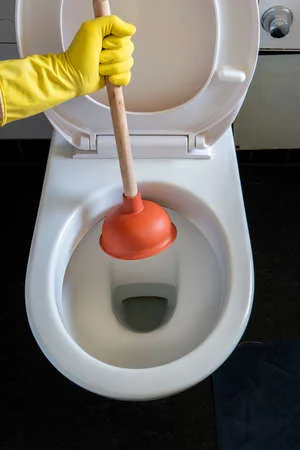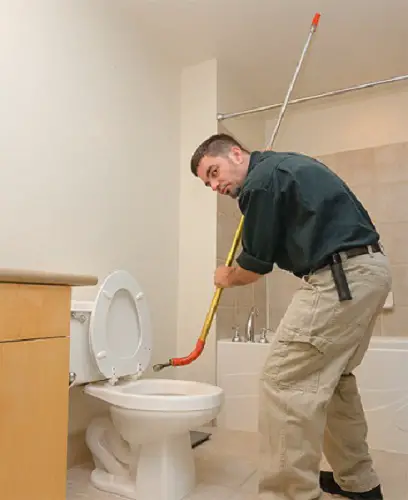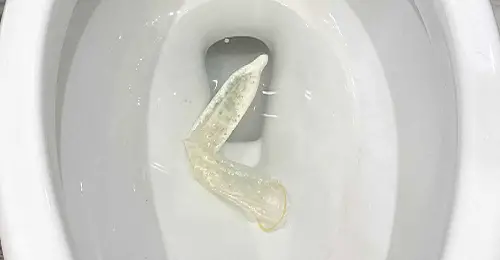For something that is an indispensable part of our sex lives as humans, the condom gets misused a lot. It has become quite a common sight for people to dispose of condoms anywhere. Of course, it is understandable to be confused, you are dealing with your semen, and condoms are not biodegradable. In this article, you will learn about proper condom disposal, condom hygiene, and other necessary pieces of information about condoms. Most importantly, the article answers one of the most common questions about condom use in the world today; Can you flush condoms down the toilet? If you are also curious about these things, read till the end. Then, don’t worry; all your questions will be answered!
What is a Condom?
A condom is a tube worn on the penis or inserted through the cervix during sexual intercourse. Basically, there are two types of condoms male condoms and female condoms. Condoms keep semen and other fluids out of the vagina, rectum, or mouth. There are a lot of street languages for condoms. The most popular one, however, is rubber.
What are the Types of Condoms?
There are four most common basis for classifying condoms;
Raw Material – Condoms are made from latex, plastic, or lambskin. This is to accommodate for possible allergies. Some individuals react to plastic (or rubber), there is always an alternative
Lubrication – Condoms are either lubricated or not. Condoms are made lubricated to recreate the wetness of the female genitalia during sexual tension. Lubrication also prevents pain during sex.
Coat – Condoms are either coated with chemicals or not. Some condoms have spermicides (chemicals that kill sperm cells) to enhance their effect.
Texture – Condoms are made with different textures available to explore if you want to boost sexual pleasure.
What are condoms used for?
They are a good number of reasons why you may want to prevent the exchange of body fluids. Here are the most important ones;
- To Prevent STDs (sexually transmitted diseases), and pregnancy
- Condoms protect you and your partner(s) from transmitting diseases to one another during sex.
For birth control
Condoms are good birth control options. They are cheap, you can get them almost anywhere, they are portable, and they are effective.
Ideally, condoms are for everyone – whether you are in a relationship or not. It just depends on why you need them. It is in your best interest to use condoms if you have multiple sexual partners. You will be saving yourself a lot of headaches and worries.
- During intercourse, you may have to guide the male genitals into the condom when you are establishing contact. Take caution, the penis may slip through. You should stop to re-adjust the condom if this happens.
- If you want to remove it, hold the outer ring, twist it, and pull it out carefully.
- Dispose of the condom in the trash can
Condoms in toilets
When condoms are persistently flushed down the toilet, it ends up causing a buildup of latex along the pipes and in the septic tank, which in turn can lead to clogs and an ineffective septic system. The safest and the most ideal way to get rid of a condom is to wrap it in toilet paper before throwing it into the trash bin
Can you flush condoms?
The answer to this is no! Condoms are elastic, they do not decay, and they can block your plumbing system. So it’s easy to see why people do it. Also, once the moment is over, a used condom is irritating, and sometimes, it takes a long time for the trash in the bathroom to fill up. So it sounds way easier to flush it.
Also, It might not go down well with you for someone else to see a condom in the trash. It could put you in trouble if you were having sex with someone you shouldn’t have. However, please don’t put it down the toilet. It’s bad for the toilet, the environment, and a bad idea overall.
Furthermore, during recycling water for re-use, flushed condoms are picked out and disposed of properly. But What happens if they are not found? Simple; they end up in the water supply pipeline and damage it. They also pose health risks to the individuals consuming the water. And in the instance where the water is not recycled, they end up in the lake and oceans – through the sewer system. You would end up killing water animals or endangering the people that will consume them.
What to do with used condoms
Don’t try to throw used condoms in the toilet. Yes, that is not healthy for the toilet. Don’t throw used condoms on the ground as well, it pollutes the environment. The most ideal and proper way to dispose of a condom is to wrap it up in a tissue and simply throw it in a trashcan.
What is the correct way to dispose of a condom?
It will take you less than five seconds to do this.
- Take out the used condom carefully from the base to the tip (to avoid the risks associated with semen exchange)
- Wrap a tissue or a paper bag or a newspaper around the used condom
You can then dispose of it in the trash can
Those are simple. Here are a few more tips you need for proper disposal.
- You can tie up the used condom the same way you’d tie a balloon to avoid semen spillage.
- Also, it is unhygienic to touch semen with your bare hands, so wrapping is pretty important.
- Just in case you cannot outrightly dispose of it, say, you are in the car, you should keep it wrapped.
- No matter what, do not leave used condoms lying carelessly in a house.
- Do not dispose of them in a lake, a beach, or any public place for that matter
- You could use an incinerator if you have one. It saves time, energy, and face (if you are concerned about that
Can condoms clog toilets
Yes, Condoms can clog toilets
What happens if you flush a condom?
It blocks the plumbing
It’s very easy for a flushed condom to get snagged up in a pipe — within your toilet or somewhere on the way toward the sewer, anywhere. Given that the whole point of a condom is to block fluids from travelling, clogged pipes are a real possibility. Flush one condom too many times, and you could end up with a toilet that does not flush, which is not very desirable.
Pollutes the environment
Flushing condoms is not good for your toilet but also for the environment. Most condoms are made of latex (natural rubber), which does not necessarily decay.
Latex condoms also contain certain chemicals that extend their shelf life and prevent them from breaking down easily during sexual intercourse.
According to estimated findings, it could take around 30 years for a condom to be broken down when in this type of environment.
Therefore, use condoms that could end up in the ocean or the nearest water source in your area. In addition, it is dangerous to humans and animals in natural water bodies.
It endangers Aquatic Life
The way plumbing structures are designed today, the contents inside them sometimes find their way into water bodies. Of course, that in itself is not healthy. However, the risk is exponential when a non-degradable substance like a condom finds its way into these water bodies. If you flush a condom down the toilet, there is a chance that it will find its way into the nearest ocean, river, or lake.
Aquatic animals may inadvertently feed on the condom or even the contents (gross right?). This would endanger the aquatic animals in the affected water body.
As omnivores, humans sometimes feed on these aquatic animals. Feeding such animals contaminated with plastic/non-degradable waste is dangerous to human health also. In extreme cases, the water body in question may be the source of water for your area or another.
Now imagine having to drink or bath with semen-contaminated water. Essentially, it is dangerous to both the humans and the animals that depend on the water in the affected area.
Read Also: Can you flush hair down the toilet
Is it okay to flush condoms?
Flushing condoms is a matter of choice, but don’t do it again. If it embarrasses you that someone may see your semen when taking out the trash, wrap the condom in two squares of toilet paper around it, and you’re done. On the other hand, if the idea of a fermenting can of semen in your bathroom makes you want to puke, then take out your trash more often. Just make sure it does go in the trash.
How to Unclog a Toilet blocked from Condoms?
You may have already fallen victim to clogged plumbing as a result of condoms. To redeem yourself, you need to either be able to break down the condom or force it out. Here are some proven methods of unclogging a condom-blocked water pipe – of course, that is if you reach it.
1. You can unclog it with a Plunger

A plunger is a device with a handle that you can thrust into pipe ways and plumbing structures. If the point of the clogging is within your reach, then you can force it out using this method. It is recommended that you push and pull with your plunger between 15-20 times for maximum effect.
2. You can drain clean with Vinegar
Vinegar and baking soda mixture in boiled water forcefully break down the condom. To do this, mix water baking soda, and vinegar. Put this on the cooking stove and allow it to heat up for 2 minutes. After that, pour it into the toilet drain and leave it for at least 8 hours. You can flush afterward.
3. You can use a plumbing snake

This is another tool used for unclogging pipes. It has a longer reach and a more flexible handle than a plunger. Using this is simple, insert it into the plumbing drain then push and pull vigorously for fifteen minutes to unclog.
4. You can also use detergents
Just as you did with the vinegar and the baking soda you can add detergent to boiling water. Afterward, you should pour the mixture into the drain and leave for up to 6 hours. Make sure to flush before removing any condom clogging the pipeline.
Here is a list of other things that should not be flushed down the toilet
Other Things You Should Not Flush Down Your Toilet
Keeping your toilet safe and free from clogs causing fatbergs goes beyond staying steer of used condoms. Below is a list of more waste you should never flush down the toilet.
- Cooking grease, fat & oil
- Baby wipes
- Paper towel
- Disposable diapers
- Dental floss
- Children toys
- Plastic bags
- Razor blades
- Cotton swabs or cotton balls
- Cigarette butt
- Sex toys
- Coffee grounds
- Sanitary and Menstrual Products (Pantyliner, tampon, applicator, sanitary towel)
- Plasters and bandages
- Medication
- Food waste
- Contact lenses
Conclusion
There are so many misconceptions about condoms. The most popular ones are among youths and married individuals. For one, it is not bad to keep condoms. You never can tell when it will be needful. Also, it is not sacrilegious to use condoms as married people. If the conditions call for it, do not hesitate. Your health should be paramount in anything you do, even over pleasure. Finally, and for the last time: Poo, urine in the toilets, rubbers in the trash can!

